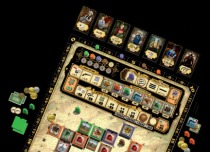Replay: Carson City
Posted by James (admin) on November 17th, 2009
Carson City is a people placement game that I really enjoyed on my first play (initial review). Lots to think about and plenty of difficult decisions. I was looking forwards to my second play and was interested to see if it would offer new challenges and opportunities.
During my second play, all the different characters continued to have their own appeal which was great as it meant no-one feels they’re left with a choice of total duds, although you can still find the characters that best fits your plan are not available because other players have already taken the ones you’d like most.
I did notice a powerful combination though which I used to win the game. One character gives you +3 firepower and I used that in conjunction with claiming the +3 firepower token too. In total, I had 10 firepower for both of the last two game turns. As a result, I could swagger through the streets of Carson City and pretty much choose which actions I wanted to perform as I could beat anyone in a duel for the right to take an action. In the final round, I was the player who used all the actions that score points apart from one because everyone else lost the duels with me to perform those actions. This seemed rather powerful, and I even felt bad for being such a bully, but I was playing in a tournament day so I had to do it. I don’t believe this is a weakness of the game as, in my first game of Carson City, two players went the firepower route – whilst they were dueling each other I constructed cheap buildings using the worker role and I won that game. So, the firepower route isn’t necessarily a certain win, but players should be careful of letting one player dominate that aspect.
In the final round (out of four), I noticed that players bought a lot more parcels of land in this game than my first play. They mainly bought them for the extra 2 points per building/mountain/house that they earn their owners at the end of the game. But these purchases had a secondary effect too with greater effects than it first appeared which was to deny the benefit/income of these locations to other players who would have used them for income because. For example, if you own the parcel of land that a mountain is on then no other player can receive income from that mountain, but they would have if it was not owned by anyone. If all players grab the extra 2 points per building/mountain/house then it is likely to be relatively even; however, the effects on other players’ income can have a bigger effect. Afterwards, we thought that we would probably buy more parcels containing mountains/houses during the earlier rounds in future games, if we could afford the meeple and cash, as it would deny income to players when it is much harder to earn. This is a really interesting tactic and could cause more duels over land.
Almost by accident, one player discovered that some non-productive moves can be very disruptive too. The green player went to buy the same parcel of land as the blue player. They dueled for it and the green player won the right to buy it; however, the green player then realised how expensive that parcel was so decided not to buy it. But, it wasn’t a waste of an action because denying the blue player the purchase of the parcel really messed up the blue player’s plans. So, negating someone else’s actions can sometimes result in a positive net gain for you.
So, more depth was discovered during my second play of Carson City. There was already a lot of choice in the game and no way near enough meeple or money to do them all (which makes for interesting and difficult decisions), but having greater discoverable depth in a game is a good thing for future plays. I can see other ways to try and play the game in terms of land ownership and just generating cash for points. In addition, I have yet to use any of the variants and I am looking forwards to using those – especially the one that removes using the dice to decide duels which may remove some of duels’ unpredictability.
Overall, I really like Carson City. It has a lot of options and potential strategies. I find it quite stressful as at no time did I not feel safe and was just waiting for someone to ruin my plans. You always feel short of resources, so finding good combinations of actions and purchases is essential. I feel there is more variety in the gameplay and tactics to be seen yet too. To me, these are all signs of a good game.
James.
[Played with 4 players]


